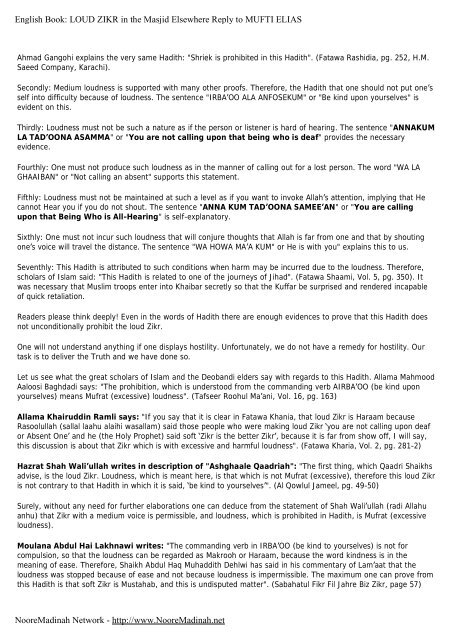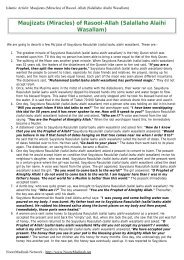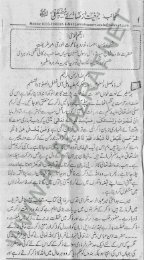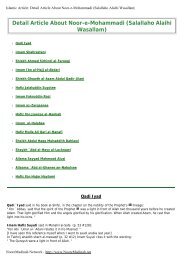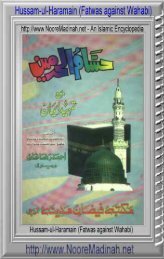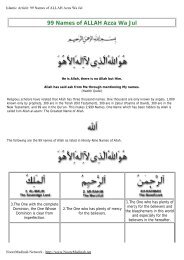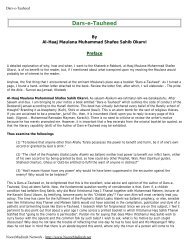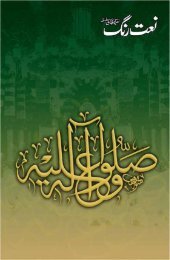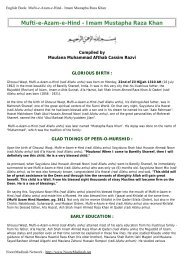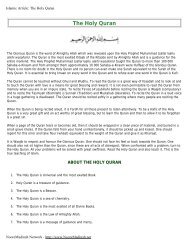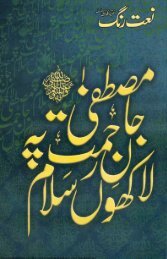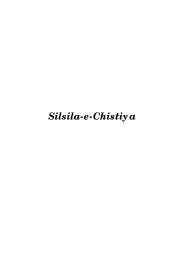LOUD ZIKR in the Masjid & Elsewhere & Reply to MUFTI ELIAS
LOUD ZIKR in the Masjid & Elsewhere & Reply to MUFTI ELIAS
LOUD ZIKR in the Masjid & Elsewhere & Reply to MUFTI ELIAS
Create successful ePaper yourself
Turn your PDF publications into a flip-book with our unique Google optimized e-Paper software.
English Book: <strong>LOUD</strong> <strong>ZIKR</strong> <strong>in</strong> <strong>the</strong> <strong>Masjid</strong> <strong>Elsewhere</strong> <strong>Reply</strong> <strong>to</strong> <strong>MUFTI</strong> <strong>ELIAS</strong><br />
Ahmad Gangohi expla<strong>in</strong>s <strong>the</strong> very same Hadith: "Shriek is prohibited <strong>in</strong> this Hadith". (Fatawa Rashidia, pg. 252, H.M.<br />
Saeed Company, Karachi).<br />
Secondly: Medium loudness is supported with many o<strong>the</strong>r proofs. Therefore, <strong>the</strong> Hadith that one should not put one’s<br />
self <strong>in</strong><strong>to</strong> difficulty because of loudness. The sentence "IRBA’OO ALA ANFOSEKUM" or "Be k<strong>in</strong>d upon yourselves" is<br />
evident on this.<br />
Thirdly: Loudness must not be such a nature as if <strong>the</strong> person or listener is hard of hear<strong>in</strong>g. The sentence "ANNAKUM<br />
LA TAD’OONA ASAMMA" or "You are not call<strong>in</strong>g upon that be<strong>in</strong>g who is deaf" provides <strong>the</strong> necessary<br />
evidence.<br />
Fourthly: One must not produce such loudness as <strong>in</strong> <strong>the</strong> manner of call<strong>in</strong>g out for a lost person. The word "WA LA<br />
GHAAIBAN" or "Not call<strong>in</strong>g an absent" supports this statement.<br />
Fifthly: Loudness must not be ma<strong>in</strong>ta<strong>in</strong>ed at such a level as if you want <strong>to</strong> <strong>in</strong>voke Allah’s attention, imply<strong>in</strong>g that He<br />
cannot Hear you if you do not shout. The sentence "ANNA KUM TAD’OONA SAMEE’AN" or "You are call<strong>in</strong>g<br />
upon that Be<strong>in</strong>g Who is All-Hear<strong>in</strong>g" is self-explana<strong>to</strong>ry.<br />
Sixthly: One must not <strong>in</strong>cur such loudness that will conjure thoughts that Allah is far from one and that by shout<strong>in</strong>g<br />
one’s voice will travel <strong>the</strong> distance. The sentence "WA HOWA MA’A KUM" or He is with you" expla<strong>in</strong>s this <strong>to</strong> us.<br />
Seventhly: This Hadith is attributed <strong>to</strong> such conditions when harm may be <strong>in</strong>curred due <strong>to</strong> <strong>the</strong> loudness. Therefore,<br />
scholars of Islam said: "This Hadith is related <strong>to</strong> one of <strong>the</strong> journeys of Jihad". (Fatawa Shaami, Vol. 5, pg. 350). It<br />
was necessary that Muslim troops enter <strong>in</strong><strong>to</strong> Khaibar secretly so that <strong>the</strong> Kuffar be surprised and rendered <strong>in</strong>capable<br />
of quick retaliation.<br />
Readers please th<strong>in</strong>k deeply! Even <strong>in</strong> <strong>the</strong> words of Hadith <strong>the</strong>re are enough evidences <strong>to</strong> prove that this Hadith does<br />
not unconditionally prohibit <strong>the</strong> loud Zikr.<br />
One will not understand anyth<strong>in</strong>g if one displays hostility. Unfortunately, we do not have a remedy for hostility. Our<br />
task is <strong>to</strong> deliver <strong>the</strong> Truth and we have done so.<br />
Let us see what <strong>the</strong> great scholars of Islam and <strong>the</strong> Deobandi elders say with regards <strong>to</strong> this Hadith. Allama Mahmood<br />
Aaloosi Baghdadi says: "The prohibition, which is unders<strong>to</strong>od from <strong>the</strong> command<strong>in</strong>g verb AIRBA’OO (be k<strong>in</strong>d upon<br />
yourselves) means Mufrat (excessive) loudness". (Tafseer Roohul Ma’ani, Vol. 16, pg. 163)<br />
Allama Khairudd<strong>in</strong> Ramli says: "If you say that it is clear <strong>in</strong> Fatawa Khania, that loud Zikr is Haraam because<br />
Rasoolullah (sallal laahu alaihi wasallam) said those people who were mak<strong>in</strong>g loud Zikr ‘you are not call<strong>in</strong>g upon deaf<br />
or Absent One’ and he (<strong>the</strong> Holy Prophet) said soft ‘Zikr is <strong>the</strong> better Zikr’, because it is far from show off, I will say,<br />
this discussion is about that Zikr which is with excessive and harmful loudness". (Fatawa Kharia, Vol. 2, pg. 281-2)<br />
Hazrat Shah Wali’ullah writes <strong>in</strong> description of "Ashghaale Qaadriah": "The first th<strong>in</strong>g, which Qaadri Shaikhs<br />
advise, is <strong>the</strong> loud Zikr. Loudness, which is meant here, is that which is not Mufrat (excessive), <strong>the</strong>refore this loud Zikr<br />
is not contrary <strong>to</strong> that Hadith <strong>in</strong> which it is said, ‘be k<strong>in</strong>d <strong>to</strong> yourselves’". (Al Qowlul Jameel, pg. 49-50)<br />
Surely, without any need for fur<strong>the</strong>r elaborations one can deduce from <strong>the</strong> statement of Shah Wali’ullah (radi Allahu<br />
anhu) that Zikr with a medium voice is permissible, and loudness, which is prohibited <strong>in</strong> Hadith, is Mufrat (excessive<br />
loudness).<br />
Moulana Abdul Hai Lakhnawi writes: "The command<strong>in</strong>g verb <strong>in</strong> IRBA’OO (be k<strong>in</strong>d <strong>to</strong> yourselves) is not for<br />
compulsion, so that <strong>the</strong> loudness can be regarded as Makrooh or Haraam, because <strong>the</strong> word k<strong>in</strong>dness is <strong>in</strong> <strong>the</strong><br />
mean<strong>in</strong>g of ease. Therefore, Shaikh Abdul Haq Muhaddith Dehlwi has said <strong>in</strong> his commentary of Lam’aat that <strong>the</strong><br />
loudness was s<strong>to</strong>pped because of ease and not because loudness is impermissible. The maximum one can prove from<br />
this Hadith is that soft Zikr is Mustahab, and this is undisputed matter". (Sabahatul Fikr Fil Jahre Biz Zikr, page 57)<br />
NooreMad<strong>in</strong>ah Network - http://www.NooreMad<strong>in</strong>ah.net


